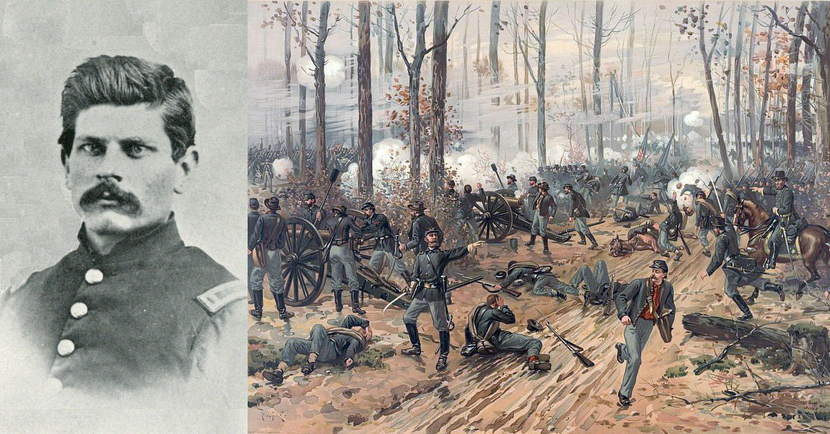Ambrose Bierce (1842–1914?)
From Ambrose Bierce: The Devil’s Dictionary, Tales, & Memoirs

During the Civil War, no other state governor was a bigger cheerleader for the Union cause and for President Abraham Lincoln than Oliver P. Morton of Indiana. From the outset of the war, Morton devoted his energy to recruiting the state’s residents into military service; 57 percent of Indiana’s eligible men would enlist in the army or navy—nearly 200,000 in all. More than 24,400 lost their lives.
Among those who enlisted during the war’s very first week was 18-year-old Ambrose Bierce, who trained at the hastily constructed facility called, tellingly enough, Camp Morton. In the army, Bierce would twice encounter the governor, if only from a distance: once at the ceremony that dispatched the Ninth Indiana Regiment to the front and again when Morton and his staff visited troops in Tennessee during a lull after the Battle of Shiloh.
It is not known what Bierce thought of Morton at the time of the war. In the following years, however, he made clear his general disdain for politicians, most famously in The Devil’s Dictionary:
Politician, n. An eel in the fundamental mud upon which the superstructure of organized society is reared. When he wriggles he mistakes the agitation of his tail for the trembling of the edifice. As compared with the statesman, he suffers the disadvantage of being alive.
In one of his satirical tall tales, Bierce imagines what happens when a local official is appointed as a military commander. The story’s title character, General Jupiter Doke, whose division is being surrounded by enemy forces, attends a banquet at a fancy hotel, “an occasion that will be memorable in the political annals of America,” and he is thrilled that the delegation greeting him included “men of political prominence and untarnished escutcheons.” Doke emerges victorious only in battle because the Confederate generals surrounding him are even more incompetent than he is.
“It is quite the fashionable fad just now to visit the front,” says a character in Randall Parrish’s Civil War novel My Lady of the North, published in 1904. Seven years earlier, Bierce wrote “An Affair of Outposts,” in which he transformed Governor Morton’s act of war tourism into a satire on politicians who so readily send young men to die.



